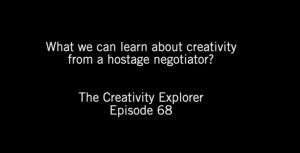
What we can learn about creativity from a hostage negotiator?
Suzanne Williams is an experienced hostage negotiator who has worked on some of the most high profile and dangerous hostage situations across the world. When she was at Scotland Yard she was the most senior ranking officer in charge of both the Kidnap and Hostage Negotiation Units. She is now an Associate Fellow at Oxford, and works as an independent crisis and hostage consultant. Over a 27 year career as a hostage negotiator she has worked on hostage situations involving way over 600 hostages. She had talked to Al-Qaeda, negotiated with sea pirates off the coast of Africa, and with environmental activists and many, many other hostage takers around the world.
A few days ago she talked to me.
About creativity.
I asked her what the job of hostage negotiator is like and she said: “It’s a job that only someone who is comfortable with uncertainty can do. It is very unpredictable. There really is no script.”
She went on to explain that very often they know very little about the hostage taker, and a big part of the job is to try to understand more about them, who they are, what they care about, who – and what – could influence them, what drives them etc.
Her job is about finding the chinks in the armour that she can use. A big part of her job is about looking for clues about who the people the other side are. She is constantly looking for hooks that she can use against them. To find “the magic formula that is going to unlock a specific situation.”
And she has to find out as much as possible from someone who is not very keen on sharing any information at all.
So how do they do it? And what can we learn about the creative process from these extreme situations?
Suzanne Williams told me about the importance of asking questions (“If you do not ask questions you do not learn anything new.”), about the need for empathy (“You really have to be able to put yourself into the shoes of the other person.”) and about the ability to practice active listening. (“You have to understand to be understood.”)
And then she shared something with me that I found so very interesting.
She said: “Sometimes there is a lot of negativity you have to block that out or it’s going to interfere with your creativity.“
To be creative you need to decide to block out the negativity? I asked her to elaborate, and she said:
“You have to stay positive. Do not let the bad guys win and remain in a positive frame of mind. What I physically have to do is to filter out negativity, but I also have to filter out any of my own bias and prejudge. I have to filter out my own experiences. I cannot have a (negative) pre-convinced assumption about how it is going to end I have to clear my mind. If I do (have negative preconceived assumptions) I could not do my job. And bad people will win, and good people will not be allowed to go home.”
What? “Filter out any previous experiences”?
“But would that not take away all the advantages of having 27 years of experience”, I asked.
Suzanne clarified that it is not about blocking out all your previous experiences – but to filter out all the previous NEGATIVE experiences!
She explained that we need to block our negativity in order to be able to be creative. To be able to see the possibilities.
Remember, she is dealing with situations that are extremely stressful, hostile, and uncertain, or as she put it: “It’s human misery. People die.” Hostage negotiations are no walk in the park and people who go to such drastic measures are not in a good place.
Suzanne approach is not about sugar-coating the situation or to be native – it is about being on an active lookout for some positive possibility that could turn a dire situation into a happy ending.
Because there is often very little information, and very big stakes involved there often are not very many positive things to go on so she needs to be in a state of mind that makes it possible for her to find that one sliver of hope, or for her to see that one faint possibility.
It could be some possibility lurking within the culture she is dealing with, the location where the hostage situation is happening, an anniversary that is coming up, a stakeholder who has a potential way in. Anything! Something! And her job is to find it.
In the words of Suzanne: “Make sure your mind is open enough to pick up anything positive.”
Her words really resonated with me. She seemed to argue that we can only find what we are looking for, and we will only go looking if we think we can find it.
She said: “You have to stay positive. Do not let the bad guys win and remain in a positive frame of mind.”
And it is true: Creativity really is to look for positive opportunities. It is about actively searching for positive opportunities. Very often when we need to be creative it’s because we are facing some kind of problem. Perhaps not a kidnapping, but something in our life has gone very wrong and we need new, fresh ideas to fix it.
The next time that happens keep the approach of Suzanne in mind. Make a conscious decision to push away all the negative judgments, prejudices, and experiences that might block you from seeing that one possibility that can take you out of your misery and solve the problem.
21
May